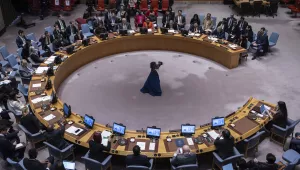Leveraging the Digital Public Sphere to Revive Trust in Democracy
DOWNLOAD THE REPORT
Executive Summary
Democracies must strengthen their home front to succeed in the competition with Russia and China that has resulted in a new Cold War and a new battle between democracy and autocracy. Democracies are experiencing high polarization, which is undermining democratic governance and trust in democracy itself. Democratic backsliding in the West has major geopolitical implications. It compromises the West’s international position and degrades
U.S. and European soft power. Furthermore, distrust and internal divisions are exploited by autocracies. Autocracies will continue undermining the liberal world order as long as the crisis of liberal democracy is not reverted. To uphold democracy and the liberal world order, the U.S. and the EU must lead an effort to regenerate democracies’ public spheres, which are seriously damaged.
Media, and particularly social media, is playing a central role on the rise of distrust and polarization in democracies. Large for-profit digital platforms, such as Twitter (now “X”), TikTok or Facebook, are contributing to this corrosive process. Furthermore, social media has been weaponized by Russia and China to manipulate political divisions and interfere in electoral processes in democracies.
The quickly accelerating development of AI makes the situation more pressing. Autocracies are using digital technologies and AI to enhance their surveillance and repressive capacities. Within democracies, unregulated, or poorly regulated AI, may work as a Trojan horse of autocracy: it may deliver productivity gains and geopolitical advantages to the U.S., but in a way that could backfire against democracy, as it could dramatically erode social trust. Today, democracies’ public spheres can be hacked by autocratic actors using digital platforms and increasingly sophisticated AI tools. Tomorrow, if human responsibility is massively outsourced to inadequately regulated AI, trust levels in democracy could further plummet.
In order to address the crisis of democracy and preserve the liberal world order, the U.S. and the EU should cooperate to revive trust in democracy at the domestic and the international levels. Such cooperation must synchronically confront three sets of challenges:
- Great power competition and the authoritarian offensive against democracy,
- The rise of political polarization and illiberalism, and
- The adverse impact of social media and AI on democracy.
These sets of challenges feed on distrust and amplify it. As a result, they have evolved into a series of cycles of distrust within democracies and into a great geopolitical cycle of distrust.
The entanglement and feedback loops among the domestic and the geopolitical cycles of distrust have resulted in a cohesive threat to democracy: a downward political spiral that is pulling societies towards enmity. This spiral feeds on and generates destructive human emotions at massive scale, such as outrage and hatred, that lead to violence, war, and autocracy, so it can be better understood as a dangerous global maelstrom of distrust, which could sink democracy worldwide. As showcased by historical evidence, domestic and international forces do not act in isolation from each other. Democratic backsliding, the rise of authoritarianism and totalitarianism, and the politics of aggression generated feedback loops in the 1930s, that resulted in WWII. Similar forces are again working in the 2020s.
If massive distrust can wreck democracy worldwide, it follows that the regeneration of trust is the path to democratic revitalization. Recommendations to regenerate trust in democracy:
- Civic dialogue should act as a compass, or lighthouse, of democratic revival. Democracy is, in essence, a dialogue, that takes place within institutions and among citizens. Dialogue shapes the public sphere of democracies. A civic dialogue based on truthful information can cut through the noise of polarization and shine through the darkness of disinformation. A strategic segment of civic dialogue is channeled and framed by digital technologies. To regenerate civic dialogue, democracies should work together on innovative strategies to contain the systemic risks of social media and AI on democratic governance. Stricter regulations of social media and AI and enforcement of anti-trust legislation are necessary but might not be sufficient. Complementary paths must also be explored.
- The EU and the U.S. should promote the development a network of safe havens for civic life online. In doing so, they would be leading a process to make digital platforms and AI work to regenerate democracy and the liberal world order.
- These safe havens could consist of global public options of civic platforms (PCPs). PCPs would be an alternative to exiting social media for political deliberations, and an anchor of different e-governance tools. They would provide a public service designed to allow and enhance a civic democratic deliberation among citizens, based on reliable information. Their inner governance could be managed through partnerships of CSOs, academia and citizen juries, that would form Digital Civic Communities (DCCs).
- PCPs, managed by DCCs, would provide safe havens for civic life online. They could function as ‘digital town squares’, in a way that for-profit social media cannot. They could be connected to democratic institutions by ‘digital bridges’, ensuring reliable information and adequate standards on ID verification, privacy, and security. The digital public sphere is loosely regulated, fragmented, and vulnerable to hacking by nefarious actors. As a result, it extends its disruptive effects to democratic institutions designed long before digital technologies could be imagined. PCPs could be the cornerstone of a transatlantic effort to regenerate civic dialogue and democracy in the digital age.
- An International Agency for Cooperation on AI for Democracy (IACAID, or Agency) should coordinate the network, setting standards and ensuring adequate PCP and DCC oversight. Through its creation, the U.S. and the EU would not only protect civic deliberation in their own societies, sheltering the public sphere from autocratic interferences. They would also revitalize the transatlantic relationship and their democratic soft power, sending a signal of moral, political, and technological leadership to the international community. The Agency would constitute the centerpiece of a strategy, named AI for Democracy (AI4D), designed to bring democracies together into a global effort to protect and restore democracy, and the liberal world order. After its creation by the EU and the U.S., the Agency should open its doors to other OECD countries, establish mechanisms to allow the participation of countries transitioning to democracy as Observers, and promote dialogue with non-democratic countries. By creating the AI4D system, democracies would take a major step to restore civic dialogue and trust in democracy, revitalizing their soft power. This system would protect and promote democracy worldwide, and help democracies navigate the global maelstrom of distrust.






